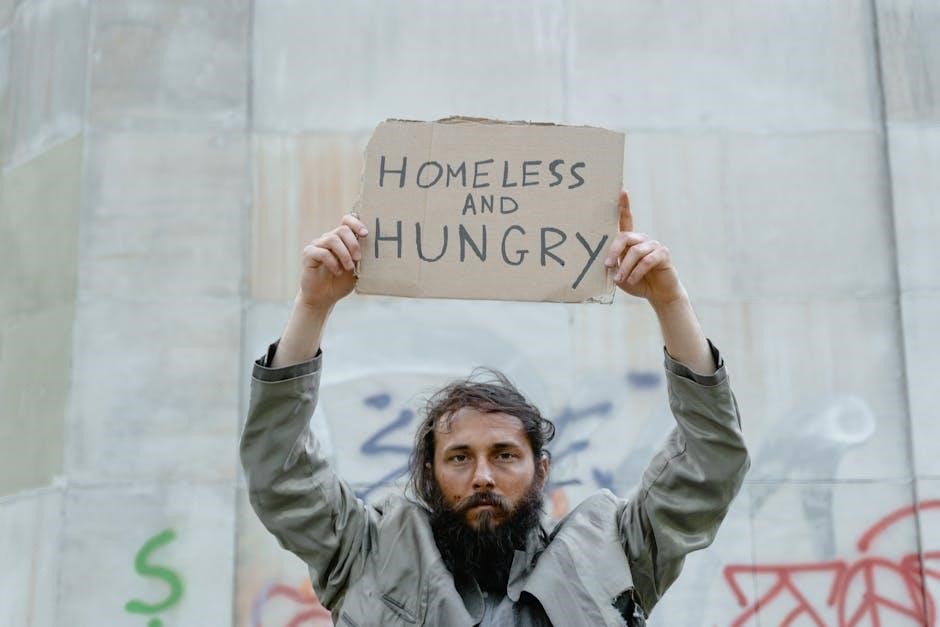Poor Economics by Abhijit Banerjee and Esther Duflo offers a groundbreaking perspective on global poverty‚ blending rigorous research with practical insights to redefine poverty alleviation strategies effectively.
1.1 Overview of the Book
Poor Economics by Abhijit Banerjee and Esther Duflo explores global poverty through rigorous research‚ challenging conventional approaches. It focuses on evidence-based strategies‚ emphasizing the complexities of poverty and offering practical solutions to improve the lives of the world’s poorest populations effectively.
1.2 Authors and Their Contributions
Authors Abhijit Banerjee and Esther Duflo are renowned economists specializing in global poverty. Their collaborative research and innovative approaches have significantly influenced development economics‚ providing empirical evidence to design effective policies and interventions for poverty reduction worldwide.
1.3 Key Themes and Objectives
Poor Economics focuses on understanding the daily lives of the poor‚ challenging traditional poverty models. It emphasizes evidence-based policies‚ micro-level interventions‚ and behavioral economics to address poverty effectively‚ aiming to bridge the gap between theory and real-world applications for sustainable development.
Understanding Poverty and Economic Challenges
Poverty is a complex issue rooted in economic inequality‚ limited access to resources‚ and systemic barriers‚ requiring a nuanced understanding of its multifaceted challenges and dynamics.
2.1 The Economics of Poverty: Definitions and Scope
Poverty‚ defined as living on less than $1.90/day‚ encompasses deprivation of basic necessities like food‚ healthcare‚ and education. Its scope extends beyond income to include inequality‚ social exclusion‚ and lack of opportunities‚ affecting over 700 million people globally‚ according to World Bank data and Poor Economics.
2.2 The Poverty Trap: Causes and Consequences
The poverty trap arises from limited access to resources‚ education‚ and credit‚ forcing individuals into low-productivity activities. Its consequences include persistent inequality‚ social exclusion‚ and intergenerational poverty‚ as highlighted in Poor Economics‚ emphasizing the need for targeted interventions to break this cycle effectively.
2.3 The Role of Inequality in Perpetuating Poverty
Socioeconomic inequality exacerbates poverty by limiting opportunities for the marginalized. Poor Economics highlights how unequal access to education‚ healthcare‚ and financial services traps individuals in poverty‚ perpetuating cycles of deprivation and hindering economic mobility for the most vulnerable populations globally.
Radical Rethinking of Poverty Alleviation Strategies
Poor Economics challenges traditional poverty reduction methods‚ advocating for evidence-based‚ innovative approaches. It emphasizes small-scale experiments and understanding the poor’s decision-making to design effective‚ sustainable solutions.
3.1 Critique of Traditional Poverty Reduction Methods
Traditional poverty reduction methods often fail due to a lack of understanding of the poor’s needs. Poor Economics highlights how top-down approaches and assumptions about behavior can lead to ineffective solutions‚ emphasizing the need for empirical evidence and localized strategies to address poverty effectively and sustainably.
3.2 Innovative Approaches to Fighting Global Poverty
Poor Economics proposes innovative solutions like microfinance‚ targeted subsidies‚ and behavioral interventions. These approaches focus on understanding the poor’s decision-making processes‚ offering practical tools to break the poverty trap and improve livelihoods through evidence-based‚ scalable interventions that address specific economic challenges effectively.
3.3 The Importance of Evidence-Based Policy Design
Evidence-based policies are crucial for effective poverty reduction. By relying on rigorous research and data‚ governments can design interventions that address the root causes of poverty‚ ensuring resources are used efficiently and sustained outcomes are achieved‚ as emphasized in Poor Economics.
Empirical Evidence and Case Studies
Poor Economics relies on empirical evidence and real-world case studies to validate its approaches‚ ensuring practical and effective solutions for global poverty reduction are grounded in observable outcomes.
4.1 Real-World Applications of “Poor Economics” Principles
The principles outlined in Poor Economics have been applied in various global contexts‚ such as microfinance programs‚ cash transfer initiatives‚ and deworming campaigns‚ demonstrating their effectiveness in addressing poverty through evidence-based‚ targeted interventions that prioritize the needs and behaviors of the poor‚ as highlighted by Banerjee and Duflo.
4.2 Success Stories from Global Poverty Interventions
Notable success stories include Mexico’s Progresa program‚ which reduced poverty through conditional cash transfers‚ and Kenya’s mobile banking services‚ which enhanced financial inclusion. These interventions‚ inspired by Poor Economics‚ demonstrate how targeted policies can significantly improve living standards and economic opportunities for the poor globally.
4.3 Lessons Learned from Failed Poverty Reduction Programs
Failed poverty programs often overlooked local contexts and lacked empirical grounding. Top-down approaches without community engagement frequently failed‚ as seen in some African and Asian initiatives. Poor Economics highlights the importance of evidence-based‚ locally tailored strategies to avoid such pitfalls and ensure sustainable impact in poverty alleviation efforts globally.
Policy Implications and Recommendations
Poor Economics emphasizes evidence-based policies‚ urging governments and organizations to adopt targeted interventions. It advocates for scalable solutions‚ highlighting the need for collaboration between policymakers and grassroots organizations to maximize impact and ensure sustainable poverty reduction globally.
5.1 Designing Effective Poverty Reduction Policies
Effective poverty reduction policies require a nuanced understanding of the poor’s daily challenges. Poor Economics suggests designing policies that address specific barriers‚ such as access to healthcare and education‚ while fostering economic opportunities. Evidence-based approaches‚ supported by rigorous research‚ are crucial for creating sustainable and impactful interventions that empower the poor to improve their livelihoods.
5.2 The Role of Governments and International Organizations
Governments and international organizations play a pivotal role in implementing policies that address systemic poverty issues. By collaborating‚ they can create frameworks that support sustainable development‚ ensure resource allocation‚ and promote inclusive growth‚ as highlighted in Poor Economics‚ to effectively reduce global poverty and inequality.
5.3 Harnessing Technology for Poverty Alleviation
Technology plays a transformative role in poverty alleviation by enhancing access to financial services‚ improving healthcare delivery‚ and fostering education. Innovations like mobile banking and digital platforms‚ as discussed in Poor Economics‚ enable sustainable solutions‚ bridging gaps and empowering marginalized communities to break the poverty cycle effectively.
Critiques and Debates Surrounding “Poor Economics”
Poor Economics has sparked debates about its pragmatic approach to poverty solutions‚ with some critics arguing its focus on incremental reforms overlooks systemic issues like inequality and power dynamics.
6.1 Challenges to the Book’s Arguments
Critics argue that Poor Economics oversimplifies poverty’s complexities‚ neglecting structural issues like systemic inequality and institutional failures. Some scholars contend its focus on micro-interventions may not address root causes‚ potentially limiting long-term impact and broader societal change.
6.2 Counterarguments and Alternative Perspectives
Some economists propose that Poor Economics underestimates the role of macroeconomic policies and international trade in poverty reduction. They advocate for systemic changes‚ such as fair trade practices and progressive taxation‚ as more effective solutions compared to localized interventions emphasized in the book.
6.3 The Broader Academic and Policy Debate
The book has sparked significant debate among scholars and policymakers‚ with some praising its evidence-based approach while others argue it overlooks structural issues like inequality and systemic oppression. This discourse highlights the complexity of poverty and the need for multifaceted solutions that combine micro and macro interventions effectively.
The Authors’ Expertise and Research Background
Abhijit Banerjee and Esther Duflo are renowned economists specializing in development economics‚ with extensive field research experience in poverty alleviation and evidence-based policy design‚ influencing global approaches significantly.
7.1 Abhijit Banerjee’s Work in Development Economics
Abhijit Banerjee’s research focuses on poverty alleviation‚ education‚ and health‚ emphasizing evidence-based policies. His work challenges traditional approaches‚ advocating for targeted interventions and rigorous field experiments to understand economic behavior among the poor‚ significantly influencing global development strategies and policy design.
7.2 Esther Duflo’s Contributions to Poverty Research
Esther Duflo’s pioneering work in poverty research emphasizes the importance of understanding the decision-making processes of the poor. Her studies on health‚ education‚ and financial access have shaped innovative interventions‚ demonstrating how targeted policies can effectively reduce poverty and improve living standards globally.
7.3 Their Collaborative Approach to Economic Studies
Banerjee and Duflo’s collaborative approach combines rigorous empirical research with real-world applications‚ focusing on understanding the complexities of poverty through randomized controlled trials. Their joint efforts have significantly influenced global poverty policies‚ offering evidence-based solutions to combat economic disparities effectively.

Related Works and Further Reading
Explore complementary works like The End of Poverty by Jeffrey Sachs and Good Economics for Hard Times for deeper insights into global poverty dynamics and solutions.
8.1 Other Books on Global Poverty and Economics
Books like The End of Poverty by Jeffrey Sachs and Good Economics for Hard Times complement Poor Economics‚ offering diverse perspectives on poverty alleviation and economic strategies for sustainable global development.
8.2 Academic Papers and Research Supporting the Book’s Arguments
Research by Banerjee‚ Duflo‚ and others provides empirical evidence for the book’s arguments‚ such as studies on microfinance‚ education‚ and health‚ demonstrating the effectiveness of targeted poverty interventions and the importance of evidence-based policy design in achieving sustainable outcomes for the poor.
8.3 Resources for Deeper Understanding of Poverty Dynamics
Additional resources include academic papers by Banerjee and Duflo‚ as well as works like The End of Poverty by Jeffrey Sachs‚ offering comprehensive insights into poverty’s complexities and evidence-based approaches for effective intervention and sustainable development strategies worldwide.

The Economics of Poverty: A Historical Perspective
The historical perspective reveals evolving poverty measurement methods and policies‚ highlighting past mistakes and successes that shape contemporary approaches to addressing global poverty effectively.
9.1 Evolution of Poverty Measurement and Analysis
The evolution of poverty measurement has shifted from basic income-based metrics to multidimensional assessments‚ incorporating education‚ health‚ and living standards. Historical analysis reveals how these changes refine understanding and inform targeted policy interventions‚ addressing poverty’s complexity more effectively over time.
9.2 Historical Policies and Their Impact on Poverty
Historical poverty policies‚ from colonial reforms to modern interventions‚ have had mixed success. While some initiatives reduced inequality and improved access to resources‚ others exacerbated disparities‚ highlighting the need for context-specific strategies rooted in evidence and local understanding to achieve sustainable poverty reduction.
9.3 Learning from Past Mistakes in Poverty Alleviation
Past poverty alleviation efforts reveal costly lessons‚ such as ineffective top-down approaches and ignoring local contexts. These failures underscore the importance of evidence-based policies‚ community involvement‚ and adaptive strategies‚ reshaping modern interventions to better address the complexities of global poverty effectively and sustainably. This historical insight is crucial for future progress.

Mental Accounting and Decision-Making Among the Poor
Mental accounting shapes the financial decisions of the poor‚ revealing how resource constraints influence behavior. Poverty alters cognitive processes‚ leading to practical yet often costly choices‚ as highlighted in “Poor Economics.”
10.1 Psychological Factors Influencing Economic Decisions
Psychological factors significantly influence economic decisions among the poor. Mental accounting and cognitive biases shape financial behavior‚ often leading to costly choices due to stress and limited resources‚ as explored in “Poor Economics.”
10.2 The Role of Social Inclusion in Poverty Reduction
Social inclusion is crucial for poverty reduction‚ as highlighted in “Poor Economics.” Marginalized communities often face barriers to education and employment‚ perpetuating poverty. Addressing these disparities through inclusive policies enhances economic opportunities and fosters sustainable development‚ breaking cycles of exclusion and deprivation effectively.
10.3 Behavioral Economics and Poverty Interventions
Behavioral economics provides novel insights into poverty interventions by understanding psychological factors influencing decisions. Strategies like “nudges” and mental accounting help the poor make better financial choices‚ enhancing the effectiveness of anti-poverty programs and fostering sustainable economic behaviors among marginalized communities effectively.

The Impact of “Poor Economics” on Global Policy
Poor Economics has significantly influenced global policy by inspiring evidence-based approaches and randomized controlled trials in poverty reduction programs‚ shaping strategies for international organizations like the World Bank and UNICEF effectively.
11.1 Influence on International Development Agencies
Poor Economics has reshaped strategies within international development agencies‚ emphasizing evidence-based policies and randomized evaluations. Agencies like the World Bank and UNICEF now prioritize interventions grounded in empirical research‚ fostering more effective and targeted poverty reduction programs globally‚ as highlighted in the book’s principles and case studies.
11.2 Policy Changes Inspired by the Book’s Findings
Poor Economics has driven policy reforms by advocating for targeted interventions over one-size-fits-all solutions. Governments worldwide now adopt data-driven approaches‚ focusing on education‚ healthcare‚ and microfinance‚ as evidenced in the book‚ leading to more sustainable and impactful poverty reduction initiatives.
11.3 Future Directions for Poverty Alleviation Efforts
Poor Economics suggests scaling evidence-based interventions‚ leveraging technology for efficiency‚ and fostering global collaboration. Future efforts should focus on sustainable programs‚ education‚ and healthcare access‚ ensuring long-term impact and equity for the world’s poorest populations.
Poor Economics concludes with a call for evidence-based policies and global collaboration‚ emphasizing the need for sustainable solutions to uplift the world’s poorest populations effectively and ethically.
12.1 Summary of Key Insights
Poor Economics challenges traditional poverty views‚ offering evidence-based solutions. It emphasizes understanding the daily lives of the poor‚ highlighting the importance of effective policies‚ education‚ and healthcare in breaking the poverty cycle sustainably.
12.2 The Book’s Legacy in the Field of Economics
Poor Economics has reshaped development economics by prioritizing empirical research and practical solutions. Its impact is evident in policy changes worldwide‚ inspiring a new generation of economists and policymakers to rethink poverty alleviation strategies effectively.
12.3 Call to Action for Further Research and Collaboration
Poor Economics emphasizes the need for continued interdisciplinary research and global collaboration. By fostering partnerships between academics‚ policymakers‚ and practitioners‚ the book encourages innovative solutions to address persistent poverty challenges effectively and sustainably.
